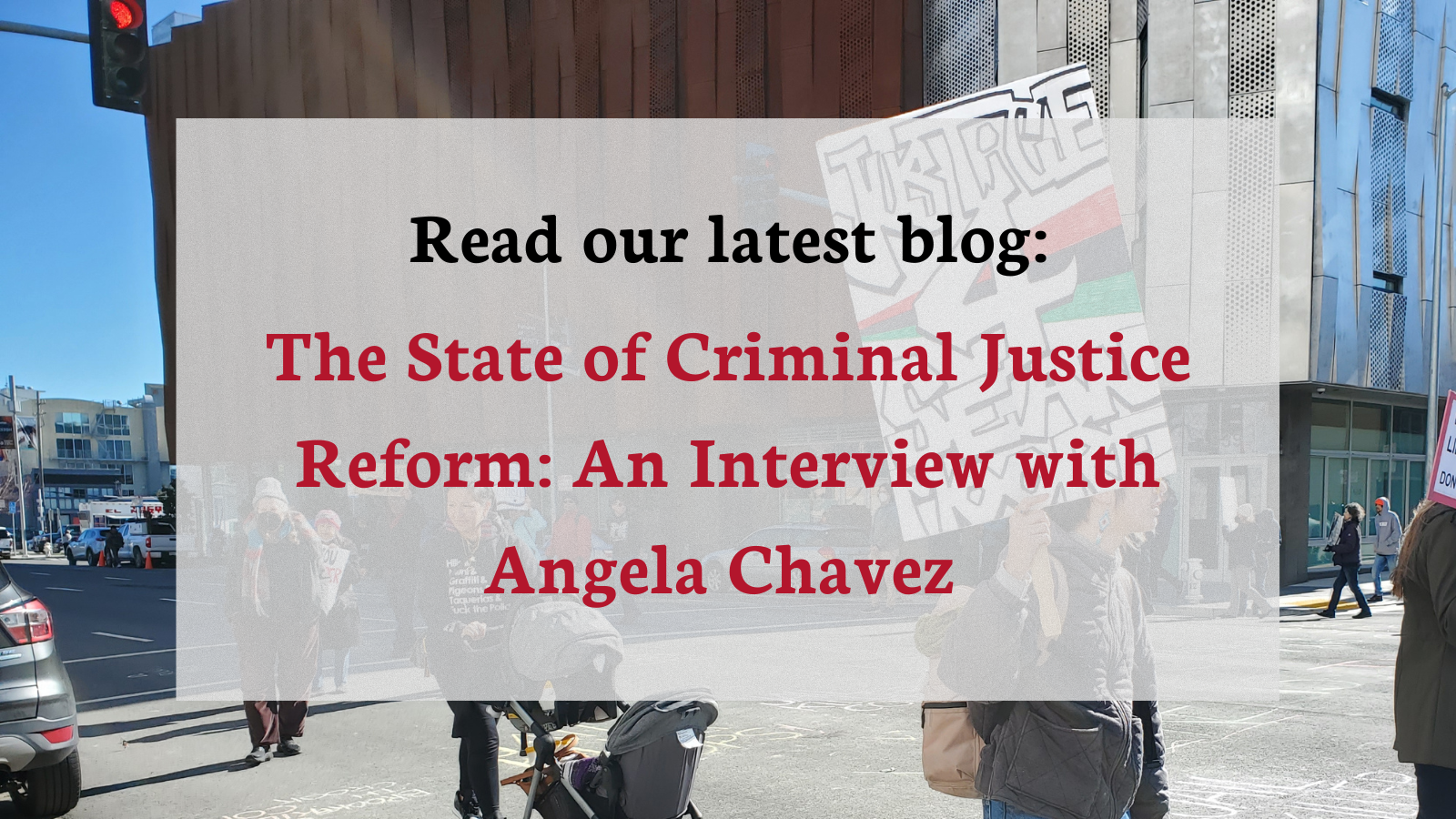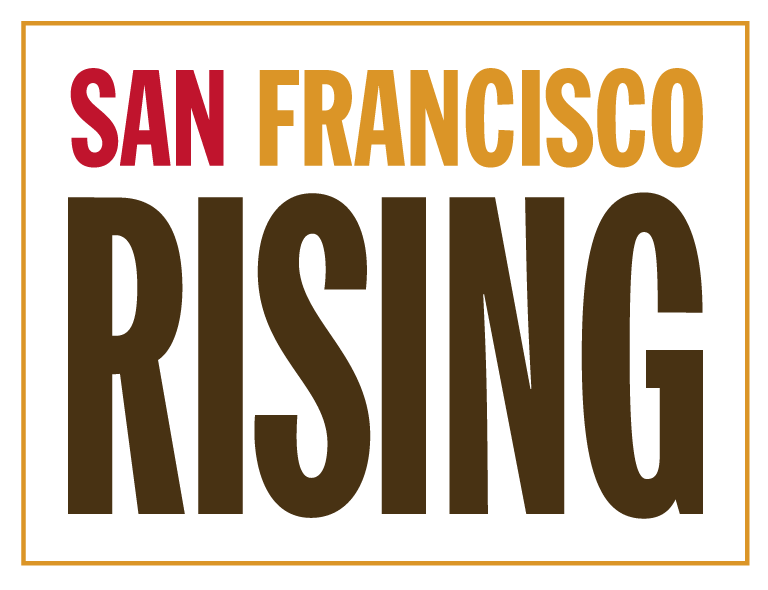SF Rising volunteer, Ethan Lee, and Communications and Volunteer Manager, Sana Sethi, sat down with Angela Chavez from Courage California to talk about the state of criminal justice reform in the current moment and the impacts on the larger movement.
Ethan: Can you share a little about who you are and what Courage California does?
Angela: I am the Communications and Public Affairs Director with Courage CA. Courage California is a state-wide, multi-issue advocacy organization. So we believe in a progressive, equitable, and representative California powered by the people. So we really aim to provide Californians with accessible digital tools such as our voter guide and our annual Courage score to equip them with the resources they need to hold their leaders accountable. We also do a lot of advocacy work to support regional partners in lifting up statewide efforts when it comes to policy, electoral work, or narrative building around issues they care about.
Ethan: There has been a trend in San Francisco towards policies that expand police powers, criminalize social problems, and increase incarceration. Recently, voters passed Prop E, which allows SFPD to use surveillance technology, and Prop F, which cuts substance dependent communities off from welfare. What has led towards the trend of harsher criminal justice policies?
Angela: I wouldn’t say it’s a San Francisco trend, it’s not unique or isolated to SF. California as a state, and even elsewhere, has been said to have a “crime wave” that’s been falsely used to blame the public safety reform policies and reformer leaders. California has been made to be the scapegoat to say “here’s this crime wave, this is what happens when you have reformer policies or reformer elected officials.” It’s not true at all. It’s a narrative that’s being used up and down our state, and nationwide. But perception is reality when it comes to voters, and the perception in California is that our state and cities are unsafe because of smash and grabs, fentanyl, and increased homelessness. This narrative is being driven by paid and earned media and it’s an opportunity for others to latch onto it as a means for others to get their special interests made. It’s more of a resurgence in harsher policies, it’s not so much a trend.
The resurgence is a response to progressive elections and policies. It has everything to do with the response to progressives getting elected and reforming policies coming to light, not so much to do with actual crime statistics or what makes communities safe. As soon as a reformer is voted in, those who want to keep the status quo, or keep harsher policies, they are already from Day 1 looking for a way to change it back to the way it was. We’re seeing deep-pocketed reactionary forces coming out to weaponize real community issues like homelessness and drug addiction to push fear-mongering tactics to influence voters, instead of supporting and investing in real solutions.
These deep pockets aren’t necessarily coming from within our communities. One of the biggest donors who has been backing these harsher policies is Neighbors for a Better San Francisco. Which sounds really lovely but are largely funded by wealthy hedge fund CEOs and happen to be a major donor to some of the current electeds in San Francisco.
These harsh and ineffective policies like drug testing welfare users and those who are accessing housing services, and granting police more power, they’re not necessarily in response to a community’s needs, they’re more informed by wealthy opportunists. They’re not data-driven, they’re driven by those who have the means to influence and are seizing the moment.
Ethan: So voters aren’t making decisions based on data, but on what they’re hearing from these wealthy forces?
Angela: Think about the last primary election and think about the mailers that came into your household, the ones that “so-and-so has been soft-on-crime!” Your average voter isn’t going to pull up the data on crime or what solutions work in other parts of the state. People are busy, they’re seeing ads on the TV, they’re getting emails, they’re being pummeled with information being paid for by someone. Those who have the most money, spend the most money to get their message across whether it be correct or not.
It’s ridiculous how misleading these mailers are. But if you’re someone who’s getting them and you see the issues in your community, you are more inclined to back the candidates who are promising quick solutions, like getting more police on the streets. Most of it is well-funded information that is very strategic and can be very misleading.
Sana (from SF Rising): I’m thinking about Proposition E. A lot of voters were seeing ads about Prop E being about cutting the paperwork that cops do and letting cops do their jobs on the streets but if you read the fine print, that paperwork was actually reporting use-of-force incidents. This is super important because it lets us know when officers are using force and who they’re using force against, which tells us how deep the racial disparities are to hold them accountable. Whoever has the most money also controls how voters are seeing the issues and in what framing.
Ethan: What’s at stake for the criminal justice reform movement given the harsher policies in the last few years?
Angela: The overall narrative is at stake. Right now, the overall narrative on public safety and criminal justice isn’t being driven by community or advocates, but instead by the well-funded campaigns that are spreading misinformation and using tactics they know will work to manipulate voters. It can be difficult for the community to reclaim the narrative. How do you combat that and push back and say, “No, actually this is what my community wants,” without the resources to get your message out there? It can be hard when the crime wave narrative is so well-funded and has soaked up people’s attention. It’s hard to get away from that once it gets started. Unfortunately, fear sells and is a strong motivator.
Another thing that’s at stake is losing the progress we’ve already made. We’ve seen the recall of Chesa Boudin – funded in big part by Neighbors for a Better San Francisco – which took away a lot of progress. Now we have a new DA, who has been in the news saying that homeless people need to be made uncomfortable. So not only did we lose a progressive DA, but we’ve got someone who is trying to maintain the status quo and worse, who is villainizing homeless people. We’re already going through other DA recalls throughout the state and signatures are being collected to roll back Prop 47 which has reduced incarceration and overcrowding. Prop 47 has done great work in our state but you won’t hear about that, you’ll hear “because of Prop 47 Police officers can’t do their jobs,” and “California’s crime wave is because of Prop 47.” With this “tough-on-crime narrative” that we’ve been experiencing over the past few years, breaking through that is going to be difficult. There’s a definite possibility we could be losing some of the progress that we’ve made.
With an increase of tough-on-crime politics, leaders are taking much more moderate stances to stay on trend. No one right now wants to seem like “the soft-on-crime person.” They want to sound like they’re doing something about crime. Getting reformer policies across the finish line is very difficult right now. Things that would have gotten votes a few years ago, really good reform policies that would have gotten votes are not getting votes or some electeds are sustaining. They don’t want their constituents or their potential donors to see them as “soft-on-crime.” They have to stay on trend and unfortunately the trend right now is swinging one way right now.
Ethan: How well do harsher laws and incarceration work as a deterrent to crime?
Angela: They don’t. The research is clear. Overpolicing and incarceration do nothing to lower crime, they just cause more disparities and economic injustices. No one goes into crime thinking “what’s the penalty if I do this?” The real solution that lowers crime is investment in communities. Communities with opportunities, communities with access to services, communities with quality of life.
Ethan: What can we do locally to keep pushing for criminal justice reform?
Angela: The pendulum goes one way and then goes another way. It always goes back and forth, it’s happened throughout history with any progressive value. When the pendulum goes back a bit, you have to push back again.
The big thing is if you can’t be active locally, at least be aware locally. When I say that, I’m thinking about city elected officials and city budgets. Oftentimes you’ll see excessive resources for overpolicing and next to nothing for schools and communities. Be aware of how money is being spent by your elected council members. If you can, of course attend meetings, understand your local budget, and when it comes time to vote, hold your elected officials accountable. If they run on a platform to do x, y, and z, and they don’t do those things when they get elected, remember that when it comes time to vote. You can see how they voted on budget issues and how much money they’re giving to different things in the City.
If you want to go a step further, I find it really important to hold the media accountable. Pay attention to how the media is covering your community, and the issues you care about. Submit letters to the editor when you see coverage that’s biased, or coverage that doesn’t include community voices, or if they don’t cover timely stories that you think they should have been covered. Call it out and demand better of them. They’re covering your community so they should be getting the whole story, the correct story, and a balanced story. A healthy media is supportive of a healthy democracy.
Ethan: Thank you so much, Angela!
Even without being in a position of power, readers can still get involved in the fight for criminal justice reform. By becoming more politically aware, especially with what’s going on in our local governments, we can make sure that public safety solutions don’t harm our communities and actually keep us all safe.
Specifically, SF Rising is joining the People’s Budget Coalition on June 24th to tell our Board of Supervisors that we demand funding for community programs that keep us safe! Amidst a record budget deficit, it’s going to take all of us to ensure that San Francisco community programs have the funding they need to keep providing vital services and opportunities for young people, LGBTQ+ communities, and more. Sign up to give public comment with us on June 24th for a People’s Budget!
Check out these blogs from Courage California to learn more about criminal justice reform:
https://couragecaliforniainstitute.org/investing-in-public-safety-how-police-are-funded/



